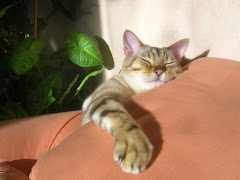How would you like a true story? A story brimming over with magic, and with more pictures than text?
Does that sound suitable, undemanding fare for the festive season?
Good . . . off we go . . .

Once upon a time there was a wonder-horse called Totilas. Well, if we're to be absolutely precise, his name is Moorlands Totilas, but, to his admirers worldwide,
his name (whispered in awed voices) is Totilas.
Renowned for his incredible dressage achievements, he was brought to London a few days before Christmas to compete in the International Horse Show at Olympia. My friend, Susan, who was visiting London, kindly invited me to join her for the finals. We were to be part of the privileged audience who would watch the legendary Totilas compete.
Surely, I thought to myself, the artistry, the music, the charisma and the heightened emotion of the audience, would be fertile ground for orbs?
Before leaving home, I put my camera in my handbag . . . just in case.
The Grand Hall was packed and, in the lead up to the dressage, there were other highly enjoyable items on the programme. These included a Shetland Pony Steeplechase.

I took a photo . . .
. . . as you can see (although, in this small version, the details are hard to make out), the excitement of the children, equalled by the excitement of the ponies, attracted several shadowy orbs in the background.

But, once the dressage started, the orbs disappeared. The competition was keen, the atmosphere intense . . . anxious . . . precise and careful. It was all highly impressive, but not, seemingly, conducive to orbs.
Until, that is, the moment arrived. The moment that everyone had been waiting for . . . the climax of the evening . . . the appearance of Edward Gal and Totilas!

And, wait for it . . . as the impressive black stallion entered the emotionally-charged arena, look what came with him!
Look carefully . . . there's nothing shadowy about these orbs, they're large . . . and substantial . . . and brilliant. Orbs that truly reflect the status of the incredible super-star.
And Totilas shone as brightly as the orbs. Rising effortlessly to the exalted heights of our expectations, he proceeded to give a spell-binding performance of effortless technique. In total harmony with his rider, he brought the gift of pure magic to his enchanted audience.
Was this a participant in a competition? That was not how it felt. It was sheer, unequalled artistry on generous display for those of us privileged to watch.

Motionless in our seats, we gazed awestruck . . . then, as Edward Gal and his incredible steed departed, the audience of eight thousand rose spontaneously to its feet and broke into thunderous applause.
Did they win the competition . . . ?
What do you think!
Not only did Totilas win, he gained the highest score of his illustrious career.

As for the orbs, I can't offer any explanation . . . I would never attempt to. Knowledge of what they are resides in the numinous, beyond the realms of mere understanding.
All I know is that when orbs appear there is often music . . . always joy . . . and always love.
One further thing is certain. If we could only make our world more conducive to orbs there's no doubt that we'd be creating a far better place for ourselves.
Those orbs endorsed an incredible evening.
Thank you, Totilas . . . thank you, Edward Gal . . . and bless you, Susan, for inviting me to an event I'll never forget.
I promised you a magical story . . . did you enjoy it?
Should Totilas return to London . . . well, what about it . . . ?









 In Mongolia, where the main mines exist, mining for Rare Earth has ravaged the landscape, poisoned the rivers, rendered the land infertile, and caused the native inhabitants of the area to evacuate their villages as they can no longer produce food or continue to live in the poisonous atmosphere. In other words, it seems that green technology is starting to be detrimental to the environment in the way that we've already seen with fossil fuel-powered technology.
In Mongolia, where the main mines exist, mining for Rare Earth has ravaged the landscape, poisoned the rivers, rendered the land infertile, and caused the native inhabitants of the area to evacuate their villages as they can no longer produce food or continue to live in the poisonous atmosphere. In other words, it seems that green technology is starting to be detrimental to the environment in the way that we've already seen with fossil fuel-powered technology.







.jpg)










 res? Above all, would he have had the opportunity to be such a wonderful ambassador for well-behaved cats?
res? Above all, would he have had the opportunity to be such a wonderful ambassador for well-behaved cats?














 Has it changed us . . . ?
Has it changed us . . . ?